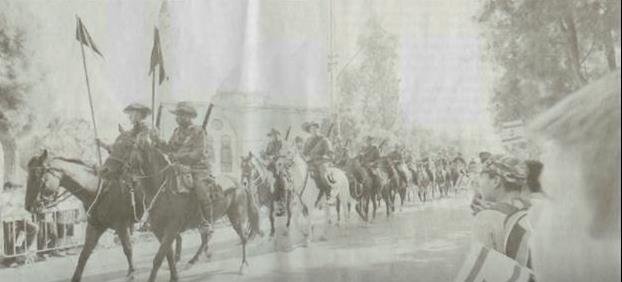In sharp contrast to the surprise attack by the 4th Australian Light Horse Brigade against the Turks on October 31, 1917, who won the Battle of Beersheba after riding toward the sun and catching the enemy unawares, their descendants and the preservers of their heritage, dressed in World War I uniforms, walked slowly west Wednesday, waited for the sun to sink and then turned back toward the east.
Hundreds had come from all over Israel and the southernmost continent to witness an enactment of the historic charge that was the prelude to a chain of events that ended with the establishment of the State of Israel.
In the desert near the ruins of the old Turkish railway station, with the wind creating a haze on the horizon, it seemed as if time had stood still.
This was the culmination of a four-day ride across the Negev, sleeping under the stars alongside horses.
There’s something very glamorous about horsemen, Maj.-Gen. (ret.) W.B. “Digger” James, the patron of the Australian Light Horse Association, and the association’s President Phil Chalker told The Jerusalem Post.
Many of the riders wore medals that had been awarded to their grandfathers. Many of the non-riders, especially those from Australia, New Zealand and Britain, wore red poppies as a reminder of soldiers who fell in the fields of Flanders during WWI.
Barry Rodgers, the head of the Australian delegation, who had led his riders first through Gallipoli and then the Negev, said the ride through the desert had given them a fresh appreciation of what their forefathers had done. “We take our hats off to them and to our horses that were our forgotten heroes,” he said. “We had our bayonets sheathed and our swords sheathed. We didn’t go for a canter, because this was a ride for peace.”
Beersheba Mayor Brig.-Gen. (res.) Ya’acov Terner, wearing a Digger’s hat with a large feather extending from the brim to the crown, spoke glowingly about Beersheba’s excellent relations with Australian organizations and individuals.
The underlying message of the day, as expressed in different ways by Terner, Australian Ambassador James Larsen, New Zealand Ambassador Hamish Cooper and Turkish Ambassador Namik Tan, as well as by the presence of German, Turkish, British, Australian, New Zealand and Israeli military personnel, was that if former enemies can becomes friends and allies, there was hope for Israel and the Palestinians.
Terner said the Turks and the ANZACs respected each other’s fallen. This was obvious in Beersheba with memorial services first at the Commonwealth War Graves Cemetery and then at the Turkish Memorial, where the three ambassadors laid wreaths, as did British Ambassador Tom Phillips and the various military representatives.
At the Commonwealth War Graves Cemetery, Larsen spoke of the “conviction, courage and sacrifice” of the young Australian soldiers, and said Australia continued to be one of Israel’s staunchest supporters.
Cooper said that this was a day of commitment to resolve differences between nations without resorting to war. For New Zealand, WWI had been catastrophic. The population of New Zealand at the time was around one million people. More than 100,000 New Zealanders were sent overseas to war. “A great number never returned,” said Cooper. Sixty percent were killed or wounded. Nearly every family in New Zealand was affected.
“Today is an important day to show people over our troubled geography, that years of conflict can turn to years of friendship and compassion,” said Tan. “The lesson of history is not to look to each other with hatred. Today this geography must be committed to friendship, solidarity and peace. My country is trying to make a sound contribution to the process of peace and friendship.”
As the Light Horse paraded past Allenby Park, scores of schoolchildren waving Australian flags lined both sides of Rehov Ha’atzmaut.
Walking at the tail-end of the parade was an aboriginal from Western Australia. Brendan Cook, whose native name is Wakuthini, attracted special attention because he was carrying boomerangs and wearing a talit held in place by a belt. Asked about the talit, Cook said that he believed that his tribe was descended from the Biblical tribe of Dan.
